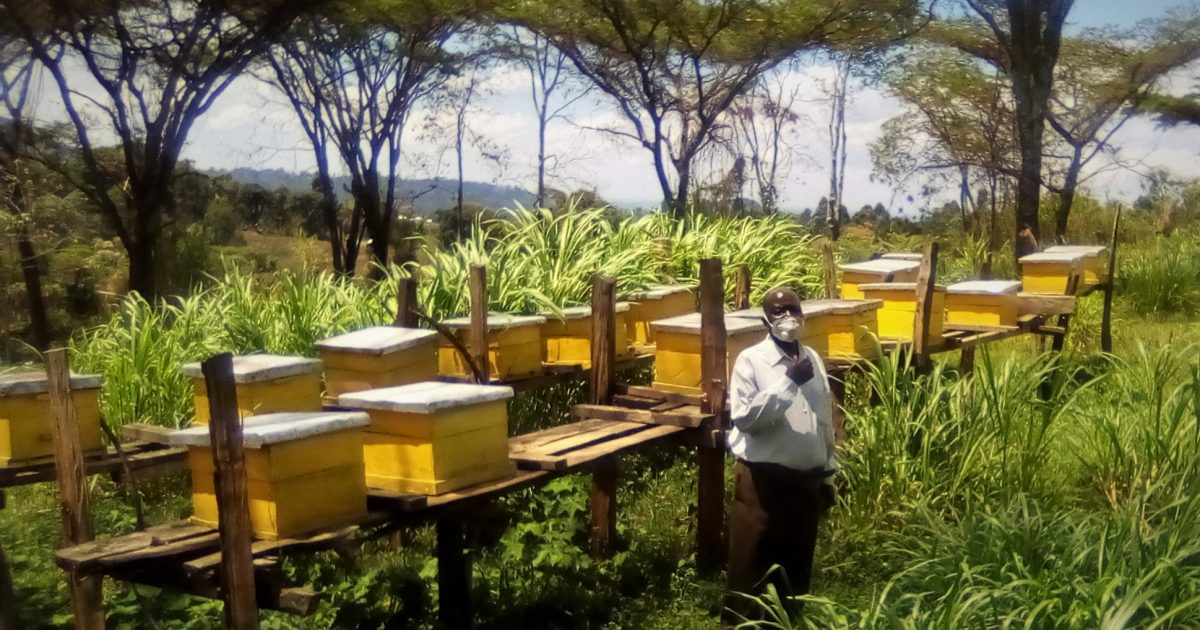He Started beekeeping as a passion and an activity that would benefit him to generate income in the process, he has land which he felt was good and enough for bee farming.
This is the story of Abraham Kamakil, a resident of Bendera village in West Pokot County who started his bee farming mid-last year.
Kamakil said he has experienced challenges that need the intervention of beehive experts who are, however, not available in the County to help run his bee farming successfully.
But somewhere along the way he has found out that he could not realize his dream in beekeeping without initiating Project Recovery Plan towards the same.
”The swarming bees have settled to four of my fifteen beehives one a half year ago and a question has lingered in my mind on what could have happened to the remaining eleven beehives that are not attracted to bees,’’ wondered Kamakil.
Kamakil said though every farmer has their own management and strategic challenges, he has hope his projects will succeed through the invention of apiary management experts he hopes to bring on board to help him realize his dream.
”I remain optimistic with successful outcome of my project since I want to inject new ideas of apiary management and maintenance which I believe will help bring positive results and solution-oriented to my project,” he proudly said.
”The challenges of each and every day give me a sense that the blessing of God makes it all to be possible,’’ acknowledged Kamakil.
In appreciation of agriculture development projects by individuals, Kamakil appeals to the government to ensure the Agricultural Extension Officers play active roles in educating and supporting farmers who are doing projects that help create employment and economic value to society.
The government has been assisting farmers to achieve their dream through field-day events and it should continue by establishing more farmers’ Field Schools to help farmers in decision-making capacity as they venture into agriculture.
He also noted that field-days help farmers interact among themselves, helping them learn how to manage challenges involved in farming.
Kamakil added that besides helping in crops pollination and essential activities in the ecosystem he said as a farmer, he has to keep bees.
Kamakil explains that there are different species of bees and how they live together in their colonies. He adds that in every colony there is a queen bee whose only job is to lay eggs.
The farmer also identifies worker bees and the drone. “The worker bee and the queen are both females, but only the queen can reproduce. The drone is male bees. Worker bees ensure the cleanness of the hive, and they also collect pollen too,” Kamakil added.
However, Kamakil pointed out that bees’ sense of smell helps them find flowers they need to collect.
“Pollen is a source of food for bees, but also dropped pollen in flight helps in pollination, a relationship bees and plants benefit mutually and can’t do without each other,” he said.
Kamakil further said there are many types of beehives that include the Top-bar, the Langstroth, and the warre hive, adding the choice of which one to use depends on the preference of a farmer.
He prefers the langstroth because of its best design for honey production due to its large box size and its frame that helps contain the comb in a stable way, unlike in the rest.
”Natural honey is in high demand and has a ready market and fetches higher prices, one-kilogram goes for Sh 600 depending on the season of its availability; Honey yield is impressive, noted Kamakil
According to him, beekeeping farmers’ help in environment preservation and conservation, they enhance livelihoods and the government should put more emphasis by offering them beekeeping equipment and training.
“Value addition in bee farming attracts individuals who want to create opportunities for employment and improve their livelihoods.
Despite the many challenges, Kamakil appeals to those in beekeeping to take advantage in every investment, noting that any venture has its own unique challenges.
He said that it is only through personal initiative by devising ways of becoming more productive, efficient, and effective instead of giving up is the way forward.
By Anthony Melly





